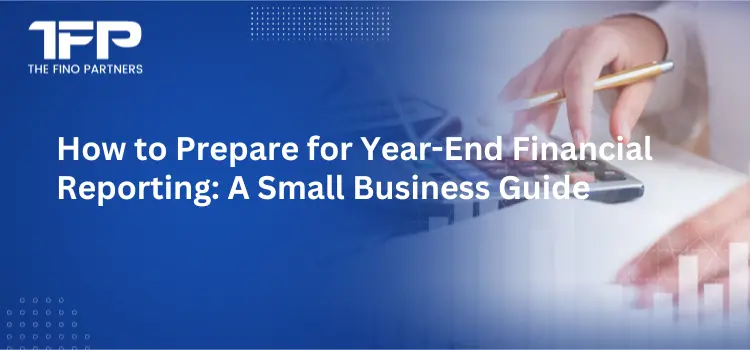For small businesses, year-end financial reporting could be a headache but an important reason to do it. It essentially satisfies two reasons: first, fulfilling the legal requirements, and second, it helps businesses know the real financial health they are in. Owners can easily navigate the process with proper preparation, reducing chances of error while in haste. Get to know the detailed process and make year-end reporting a breeze by following this guide. We will be discussing key steps, tips, and best practices in getting through year-end reporting hassle-free. The focus will be on key activities such as availing services for good payroll management.
1. Why Year-End Financial Reporting is Crucial for Small Businesses
Year-end financial reporting allows one to review business performance and make decisions based on insight into the profits, losses, and the general trend of the financial health of the business. Proper preparation for the closure at the end of the year will keep the business in tandem with tax laws and regulations, avoiding penalties. This will set up real financial goals for the next year.
2. Preparing financial statements and reconciling accounts
The most important part in the year-end reporting is the preparation of financial statements. The following are the steps for preparing a financial statement:
a. Gathering All Financial Documents
- Gather all your invoices, receipts, and financial statements.
- All your income and expenses should be properly accounted for.
- Make sure that each transaction is recorded in your accounting program.
b. Account Reconciliation
- Reconcile Bank Statements with your books
- Match Statements received from the bank against your internal records.
- In case of mismatches, find them and correct them.
- Make sure that no payment goes unaccounted for and no transaction is missed.
c. Review Financial Statements
- Prepare the balance sheet, income statement and cash flow statement
- Make sure that all figures and maths are correct.
- Get an insight into your business's financial condition by using these statements.
3. How to Review and Adjust the General Ledger?
The general ledger is at the core of your accounting system. These steps will ensure it's free from errors:
a. Review All Entries
- Go through each entry and make sure it has been posted to the proper account.
- Gently underline any mistakes or misclassifications and correct them.
- Check that all journal entries have been posted and accounted for.
b. Adjust for Accruals and Deferrals
- Journalise any expenses which have not been paid but need to be claimed or any income which has not been received but needs to be accounted for.
- Adjustment to T-accounts regarding any prepaid items or deferred items
- Using the above financial statements, ensure a true profit or loss is shown.
c. Ensure that Accounting Standards are complied with
- Check all the entries against the accounting standards that need to be complied with
- If need be, seek a professional.
- Year-end accounting services may want to be considered for accuracy.
4. Closing Books and Preparing for Tax Filing
The proper closing of books provides the smooth way to tax filing. To close your books, you need to:
a. Close revenue and expense accounts
- Close all revenue and expense account to RE.
- Ensure all temporary accounts are closed.
- Prepare final Trial Balance ensuring that Debit equals Credit.
b. Review Payroll and Employee Taxes
- Ensure all of the payroll taxes are paid up and reported.
- Audit employee records for any inaccuracies.
- Reconcile any discrepancies before filing.
c. Prepare for Tax Filing
Gather all the necessary tax documents.
- Be compliant with the local, state and federal tax laws
- Outsource the Year-End Accounting Services to make sure it is accurate and in compliance
5. What Are the Common Mistakes to Avoid in Year-End Financial Reporting?
Year-end financial reporting can be an intricate activity. Here are common mistakes to be avoided so that accuracy can be ensured.
First of all, reconcile all accounts. All expenses and income should be properly accounted for. No last-minute entries shall be done in the data, as they could load with an abundance of errors. Watch out for missing entries or duplicate entries. Ensure the financial data abides by the taxation regime. Internal controls are not to be overridden; internal controls are in place to protect the integrity of the data. Last but definitely not least is the need for a very close review of the financial statements before their submission.
It is attention to such matters that helps one avoid making costly mistakes. The accuracy that underscores a year-end report will set it apart from others.
The following are some of the mistakes that should be avoided to have accurate and smooth year-end reporting:
a. Ignoring Reconciliation of Accounts
- Always reconcile bank statements with internal records.
- Unreconciled accounts may lead to errors in financial statements.
b. Not Checking the Financial Statements
- The periodic checking would provide accuracy and would avoid any probable error.
- Missing of such steps could lead to incorrect submissions to the tax authorities.
c. Not Making Adjustments for Accruals
- All the revenues and related expenses must be accounted for within the correct period.
- The accrued adjustments are very crucial for proper reporting of the finances.
Conclusion
Year-end financial reporting does not need to be so excruciating. Keeping yourself organized, reconciling your accounts, and using tools like payroll management services can make things easier for you and help bypass some of those pricey errors. Regular financial reviews save hours and bring to light very valuable information on the health of your business. So act now and have a smooth year-end reporting experience.




























